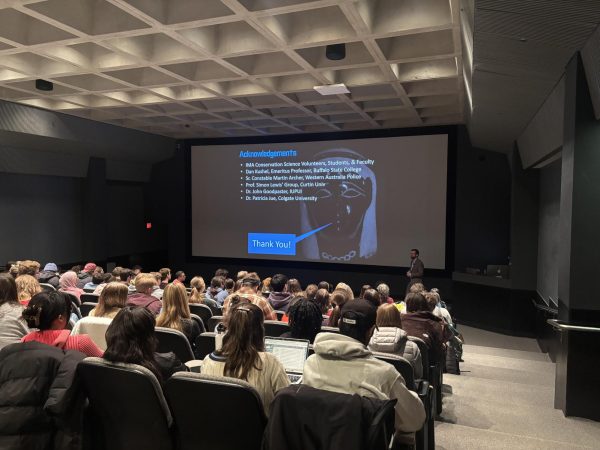Book Review: ‘My Year of Rest and Relaxation’
In a post-COVID-19 world, Otessa Moshfegh’s “My Year of Rest and Relaxation” found its target audience. Released in 2018, the critically-acclaimed book skyrocketed to even more fame outside of the literary world thanks to its social media popularity, its early 2000s aesthetic and a widespread curiosity about mental health. The premise of the book is remarkably in tune with pandemic literature, considering Moshfegh published the book in 2018.
The narrator, who is never named, is a Columbia graduate living in Manhattan and working at an art gallery. She lives her life supplemented by sleeping and consuming anti-anxiety medication or any other pills she can get her hands on. She becomes annoyed that her everyday life (work, her best-friend Reva and her on-and-off boyfriend Trevor) is getting in the way of sleep. So, with the aid of an experimental artist and forgetful therapist, she sleeps for four months, waking up every day to eat, shower and ingest sleeping pills. The artist brings her pizza and shampoo in exchange for the ability to create whatever he likes in her empty apartment and with her sleeping body. She wakes up with a moderately better outlook on life.
This all takes place from 2000 to 2001. The novel ends on September 11, 2001, with the destruction of the twin towers and Reva’s death in the collapse.
I saw this in a bookstore, it had hot pink print and a sad-looking Victorian woman on the cover. It was in the Book Tok section of Barnes and Noble. This was all I needed—I bought it.
I was expecting to be wowed; I found myself disappointed.
This isn’t to say the book was bad. The writing was captivating and I laughed out loud at parts, but I found myself being pulled through the novel at a sluggish speed. It felt like I was thinking the narrator’s thoughts for her. The problem was the narrator herself, and not because I don’t know what Moshfegh was doing. I understand the push to prove that female main characters can be unlikeable. I get the commentary on pre-9/11 New York City, and the privileged people that flocked to it.
The narrator dislikes her best friend Reva, insulting her looks, attitude and every word. She’s comically bad at her job, sleeping in a closet and forgetting tasks. But she is bankrolled by her deceased parents’ money and unemployment. The narrator is the epitome of everything shallow and terrible about the privileged elite of New York in the early 2000s.
All of this is fine. If the book were just a look into and criticism of a rich addict who is also a depressed insomniac, I wouldn’t be mad. But the last 10 pages or so make it a story of redemption; when Reva dies in the events of the 9/11 attacks, the narrator is reminded of the fragility of life.
The narrator’s self-improvement is aggravating. She becomes a better person because she essentially overdoses on sleeping pills, doesn’t die and then sees her best friend, who she has only recently started liking, die in a terror attack.
I understand why “My Year of Rest and Relaxation” is popular and acclaimed. But, to redeem a character whose whole persona is a mean, New York socialite with an addiction who takes a ‘life-changing’ nap is a lot to pull off.

Samantha Wotring is a senior from Houston, Texas, majoring in English creative writing and history. She has previously served as an Assistant News Editor...




